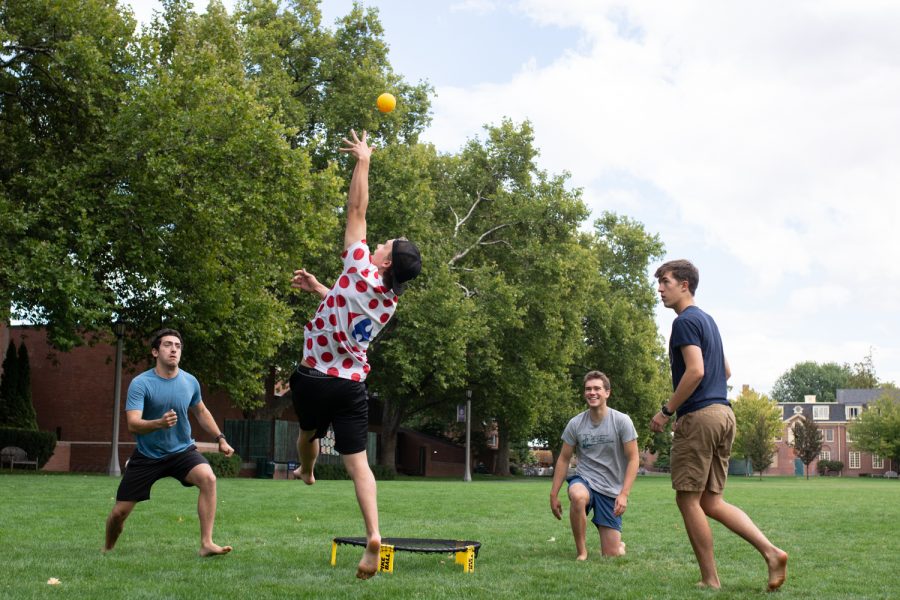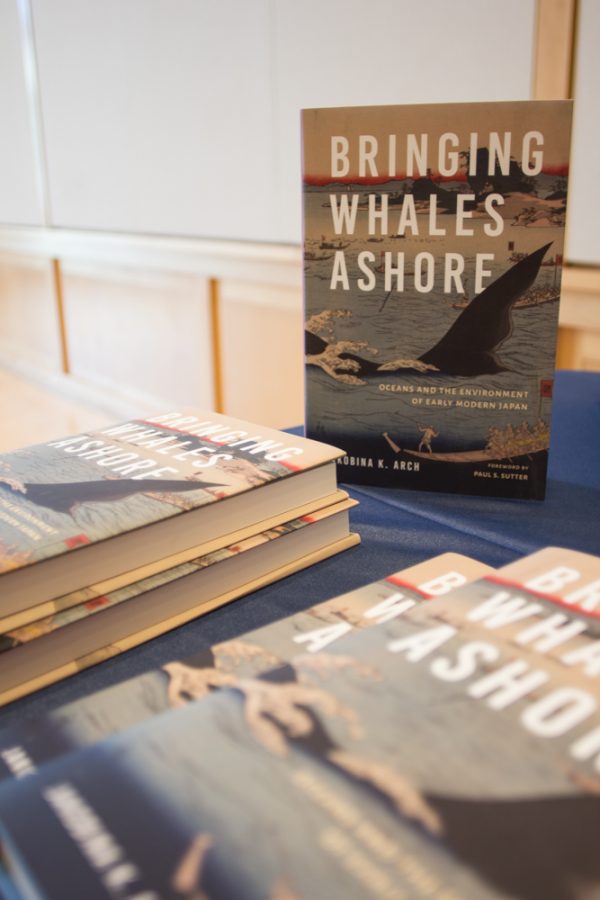After yesterday’s doom and gloom, I am happy to report that today was a much better day. This morning began with a breakfast of toast, yogurt, and fruit that would have been standard had it not been for the addition of a sort of glutinous rice jelly topped with green kinako (soybean powder). If you ever travel to Japan, there will doubtless be some occasions on which you’ll look at a plate of food set before you and think, “What the heck IS this?!”, and this was one of those occasions for me. At first, I thought that Ai-san had given me a huge plate of wasabi, as from a distance the color and consistency looked very similar. However, the jelly turned out to have the same taste and texture as sweet mochi, a chewy sweet that I really enjoy. Although the jelly was really difficult to eat with chopsticks (think trying to pick up melted cheese with two bamboo sticks), it was quite good.
Class this morning went pretty well. We have progressed to the third chapter in our textbook, which covers the history of Japanese imports, a topic that isn’t nearly as boring as it sounds. As I discussed in a previous post, there was a period of time in ancient Japanese history during which the Japanese people essentially copied everything China did. Perhaps the biggest example of this “flattery by imitation” is the city of Nara, which at the time of its construction was a direct copy of the Chinese city of Chang’an. Japan even began rice cultivation as a result of Chinese influence, and the crop quickly became a staple food in the island country. Although China was without a doubt the principal influence on Japanese culture, transferring everything from religion to architecture to styles of clothing, Japan has also incorporated aspects of Portuguese, Spanish, and Dutch culture into its own traditions. One of my favorite Japanese foods, tempura, came to Japan with the Portuguese in the mid-sixteenth century. Even now, Japan continues to absorb and incorporate culture from other countries, as evidenced by the multitude of loan words from other languages such as hanbaaga (hamburger, originally English), arubaito (“part time job,” from the German arbeit), and ankeito (“survey,” from the French enquête). Holidays such as Christmas and Valentine’s Day have grown immensely in popularity in Japan, as have foreign foods.
After the day’s classes had come to an end, I ate lunch (soba noodles) while talking with my parents over Skype. We chatted at length about my class situation and my experience over here so far, and I received some great advice from them about how to deal with the issues I’ve encountered. They reinforced my tentatively cultivated attitude that I’m here to learn and have fun, two things which I can accomplish without studying to the point of exhaustion and stressing myself out.
At 1:30, the PII students gathered in Rifare’s biggest classroom to listen to a guest lecture by poet, translator, and activist Arthur Binard. It was a fascinating talk. Mr. Binard has lived in Japan for 22 years and has become fluent in Japanese to the point where he can write poetry in a language not his own. In 2001, he won the Nakahara ChÅ«ya Prize, the only foreigner to receive the prestigious award that year (perhaps ever, I’m haven’t been able to find a list of recipients). Mr. Binard claims that he became so proficient in Japanese by conversing with shopkeepers; wandering the streets of Japan, staring at road signs and deciphering the kanji with a handheld electronic dictionary until he understood them; and going to theaters to listen to rakugo stories.

Rakugo stories are short anecdotes performed by a single actor with minimal use of props. The actor uses a handkerchief and a fan exclusively to symbolize all sorts of objects, from wallets to drinking glasses. The stories usually have a punchline or surprising twist for the audience’s entertainment.
A particularly charming story that Mr. Binard shared with us describes a competition among miserly old men to see who can be the stingiest. One of these men decides that he’s going to spend as little money as possible on food, subsisting on rice alone. He moves into a tiny apartment next to an eel restaurant. In these types of restaurants in Japan, the fatty eel meat is cooked in a sweet soy sauce, producing a lot of smoke. When meal time comes around, the miser prepares his rice, then opens the window of his apartment to let in the fragrant smoke from the restaurant, inhaling it as he eats to “flavor” the rice. This goes on for quite a while, until one day the eel restaurant owner comes to the miser’s door with a bill. “This is the charge for sniffing,” he says. The miser, indignant, has no choice but to pay. He removes a heavy gold coin from his pocket and throws it down on the table. Ka-plink! “There, that should be good enough.” says the miser, “I’ve paid for the smell of food with the sound of money.”
Mr. Binard told us that when he heard this story, he thought it must have been of exclusively Japanese origin. Paying for the smell of food with the sound of money was something so Japanese, the story could’t possibly have originated anywhere else. However, over the last 20 years, Mr. Binard said that he had looked for and phenomenally discovered several versions of the story, including a French version, Turkish version, Korean version, and two African versions. He hopes to find more versions in the future and eventually compile them into a book.
In addition to writing poetry, Mr. Binard is also an outspoken opponent of the proliferation of nuclear power plants, and was promoting his views through poetry and activism long before the Fukushima Daiichi Plant meltdown. Although I myself have not really decided where I stand on nuclear energy, there was absolutely no doubt as to Mr. Binard’s opinion on the issue. He claims that nuclear power plants exist only for the production of weapons-grade materials, and that the government’s insistence that nuclear plants provide clean energy is nothing more than a facade. He described nuclear energy as the samurai sword that is so sharp that one cannot feel it cut through one’s body until one literally falls to pieces yards away from the site of the attack. Incidentally, there is a very long word in Japanese used to describe this phenomenon: hanautasanchouyahazugiri (Humming Three Blocks: Arrow Notch Cut, or “Whistling through his nose and walking for three chou, the man does not realize that he has been cut right down the middle, as though his attacker had sliced through a flying arrow.”)

Mr. Binard told a very interesting story about a friend of his who lives in Ooma, a town on the very northernmost point of the main island of Honshu, where a new nuclear facility is currently under construction. The power company bought out a huge chunk of the area, offering the inhabitants large sums of money to give up their land for development. Mr. Binard’s friend’s mother, Asako Kumagai, was the sole villager who refused the power company’s offer, claiming that nuclear energy was “bad for living things” and that selling her house would go against her personal philosophy. The power company offered Asako millions of yen in exchange for her land, representatives coming to her house every day to offer again and again, but she denied them. “If I have the sea and my vegetable patch,” she said, “I can feed my family. I don’t need your money.” There was a lengthy lawsuit, and Asako fell ill and died (apparently under mysterious circumstances) before she could hear the outcome of the trial: she could keep her house. Today, Mr. Binard’s friend continues to live in her mother’s house, now literally in the shadow of an enormous construction site.
Lastly, Mr. Binard imparted to us the rather disturbing notion that we are consuming Cesium 137 with every meal we eat in Japan.
Needless to say, it was an incredibly thought-provoking lecture, although I wondered a little at PII’s choice of including Mr. Binard in the program’s curriculum. His awe-inspiring fluency in Japanese is certainly something that I aspire to attain for myself in the future, but almost his entire lecture was in English, and an activist’s lecture seemed a little out of place among the other extracurriculars we’ve participated in so far. (Making Japanese sweets, origami, touring Kenrokuen Garden, and listening to an activist poet describe the horrible symptoms of radiation poisoning…one of these things is not like the others.) However, Mr. Binard’s talk was without a doubt the most socially relevant activity in which we’ve taken part so far, and I wish we got to engage in discussions more pertinent to Japan’s current social climate.
Pretty much every speech we have listened to as a group–at the PII Welcome Ceremony, at the Prefectural Government Office, and Mr. Binard’s talk–has referenced the Great Eastern Japan Earthquake and Fukushima Daiiichi Plant meltdown. The March 11th earthquake has noticeably affected the lives of the Japanese people; the desire to conserve energy here has redoubled, and Japan was very conscious about energy conservation to begin with. I see flyers and posters promoting earthquake preparedness in Rifare and around town. Despite these obvious acknowledgements of the March 11 catastrophe, the floor has not yet been opened for discussion of this matter among the PII students and teachers, and I rarely notice any mention of nuclear power or the earthquake on television (though this could be because I can’t follow the Japanese news well enough to pick up on those references). It seems that here, in some small, rural villages, the citizens welcome the introduction of new nuclear power plants that prevent brain drain from their towns by ensuring jobs for their children and grandchildren. Although the danger is obvious, as evidenced by Fukushima Daiichi, Chernobyl, and Three Mile Island, these people would rather have their children stay at home and work in the power plant than move to Tokyo or Oosaka in search of work. In Mr. Binard’s view, this merely perpetuates the dangerous cycle of nuclear energy and increases the likelihood of another imminent disaster. I will have to do more research and talk to other more informed citizens before I make up my own mind about nuclear energy, as Mr. Binard’s talk really inspired me to look into this matter further.
After we had thanked Mr. Binard and said our goodbyes, I retreated to the library to get a head-start on this weekend’s homework, as the Noto Peninsula trip will undoubtedly take up most of my time. I already feel as though, despite the difficulty of my classes, I’m learning a lot. I don’t have to look up nearly as many kanji now, as I’m started to add more to my memory bank. After finishing up some reading, I went out into the T.V. lounge and talked with a couple of Princeton students in the second-year Japanese class who made me feel a lot better about my class situation by sharing their own troubles. Apparently, relations among the second-year students are fairly tense. The two guys I spoke with attributed this strain to a desire on everyone’s part to succeed and come out on top as the most accomplished student, making a good name for themselves and their school. The guys felt exasperated upon seeing their classmates conspicuously cover their tests with their arms to prevent cheating and writing frantically after the testing period had ended in order to fit in as much content as possible, expressing their regret that the learning environment is not cooperative. I also found out that at Princeton University, Makino sensei taught fifth-year Japanese, the highest level Japanese course offered at the institution (he’s retired now). Furthermore, in addition to writing the two dictionaries I saw on our list of recommended texts, I discovered that he also co-wrote the Nakama textbook series. No wonder everyone has such trouble understanding him, he’s a huge deal in the world of Japanese academia; it’s quite likely that he’s stuck in fifth-year teaching mode and is also perhaps overestimating our abilities.
My day ended on a strange note as I walked home from the train station at twilight. Strolling along my normal route, I was a little weirded out when the young man walking in front of me kept looking back over his shoulder at me. Although it’s fairly commonplace for foreigners to receive stares and hear whispers of “gaijin” as they pass, the frequency with which this young man kept looking at back kind of unsettled me. Eventually he turned off the main road, and I assumed he was heading toward his house, so I sped up to walk past him. He called out, “Excuse me!” and I turned to face him.
“Where are you from?” he asked in Japanese.
“I’m American,” I replied.
“You’re pretty!” he exclaimed, and I demurred politely, as you’re supposed to when you receive a compliment here. “What are you doing right now? Do you want to go somewhere and talk?” he asked. Oh, he’s hitting on me, I thought. This is a little awkward. I explained that I was late for dinner and that I needed to return home. I kept walking, and the guy followed me, talking all the while about how he wanted to visit America and asking me about my studies. He seemed like a decently friendly person, but I couldn’t ignore the fact that my “sketch radar” was beeping, as Ai-san had warned me before about going off with strange men (see the “I’ll take you to the train station” incident, which actually turned out to be the best possible decision in that situation but could have gone very badly indeed had Yamashita-san not been so kind). We walked for a while, and at several points he made as though to turn off the main road and (I hoped) go back to his own house, but once he saw that I wasn’t following him, he’d turn around and come back.
Finally, he asked, “Where are we going to sit and talk?” I explained again politely that my host mom was expecting me at 6:30 and that I was late, and that I couldn’t talk right now. “Just for a little while,” he said, and turned off the main road again, gesturing for me to follow him. “Umm…I’m going home now.” I said, and quickly crossed the street, walking hurriedly away. Using my best Olympic fast-walk, I put a lot of distance between myself and the guy, and finally relaxed enough to reflect on our odd exchange. It could have been that he was just a student looking to practice his English and I was just being irrationally paranoid, but I found it really strange that he didn’t just want to talk outside or chat while we walked. I thought about what my own actions would be if I came across a Japanese person in the United States, and ultimately decided that I probably wouldn’t immediately invite them to go off with me and talk, especially not if I were a man inviting a Japanese woman. Perturbed, and worried that the guy might still be following me, I practically ran the rest of the way home and didn’t truly unwind from my tense and nervous state until I had closed the door to the Suzuki household behind me.
I ate tempura for dinner and watched Doraemon (a popular Japanese cartoon show) with the boys while Ai-san dozed on the couch after a long day of work. I had been hoping to tell her about Creeper-san and receive justification for my disquieted feelings, but she was sound asleep and woke up only to put the boys to bed around 9:30. I’m really looking forward to getting a good night’s sleep tonight. We’ll see, maybe I’ll even indulge and sleep in until 9:00 tomorrow morning!




